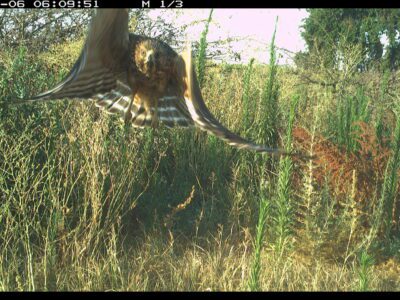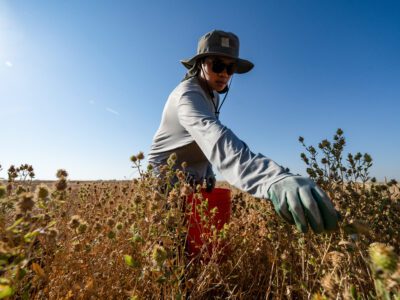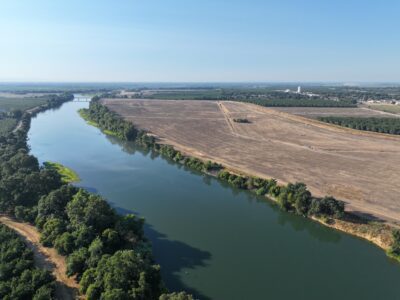
Two years ago, River Partners and our allies were already working to save endangered riparian brush rabbits from extinction and protecting them from the threats of habitat loss, flooding, and natural disaster. Then, a new challenge emerged that threatens to wipe the rabbits out: rabbit hemorrhagic disease, a virus which spreads rapidly and is fatal in 90% of cases for domestic and wild rabbits.
The working group leapt into action. There was no time to waste to start protecting the last remaining populations of these endangered rabbits clinging to existence in the San Joaquin Valley. Our early, preemptive action to vaccinate them from the spreading virus alongside our team of conservation partners may be what prevents them from being wiped out entirely.
Endangered Rabbits, a Deadly Virus, and a Heroic Conservation Effort
In March 2020, a deadly and easily transferred disease affecting domesticated and endangered rabbits was first introduced in the U.S., appearing in New Mexico. Soon thereafter, rabbits tested positive in Southern California, and it was only a matter of time before the disease spread northward to the San Joaquin Valley. But how much time, no one knew.
This May, the first case of Rabbit Hemorrhagic Disease Virus 2 (RHDV2) in Stanislaus County was confirmed in a deceased riparian brush rabbit found at the San Joaquin River National Wildlife Refuge near Modesto, one of the last places on Earth where riparian brush rabbits are found.

In early June, RHDV2 was confirmed in another deceased riparian brush rabbit found at River Partners’ Dos Rios Ranch Preserve located across the Tuolumne and San Joaquin rivers from the refuge.
This news comes despite our best efforts to vaccinate and prevent the spread of the virus in collaboration with the California Department of Fish and Wildlife (CDFW), US Fish and Wildlife Service (USFWS), and Oakland Zoo.
“We’ve been working hard with partners to vaccinate as hundreds of rabbits since August 2020,” notes River Partners Director of Science Erin Hagen. “We didn’t know how much time we had before the virus would spread here to these remaining populations. We wanted to give the rabbits a fighting chance.”
We will continue to focus our efforts on restoring habitat and vaccinating the rabbits from RHDV2, which has been shown to be highly effective in helping prevent the spread of the disease. Without a warning and chance to prepare, the virus could have wiped them out, removing an essential inhabitant of the San Joaquin Valley’s riparian corridors forever.
Restoring Rivers for Riparian Brush Rabbits
Once, riparian brush rabbits proliferated in their historic range along riparian corridors in the Central Valley. Today they’re one of California’s most endangered mammals since losing 95% of riparian habitat in their range since the mid-1800s.
A mere 300 brush rabbits were clinging to existence two decades ago in the San Joaquin Valley. After years of effort to rebuild their habitat at our Dos Rios Ranch Preserve and nearby San Joaquin River National Wildlife Refuge, populations have rebounded to approximately 2,000—more than a 650% increase.

“We try to locate areas where we can continue to build a corridor of habitat that is needed—areas where rabbits should be, but don’t have access for whatever reason,” says River Partners Ecologist Haley Mirts.
Since 2014, River Partners and our dedicated partners have been on the front lines of rabbit conservation, reconnecting fragments of remnant riparian ecosystems to form rabbit corridors essential for the long-term survival of the riparian brush rabbit. We hope to one day be able to remove them from California’s endangered species list. But for now, there’s a lot of work that needs to be done to establish truly thriving populations.
How You Can Help
- If you see a dead or sick rabbit, report it to CDFW’s Wildlife Health Laboratory at (916) 358-2790, or file an online mortality report through CDFW’s website, to help those of us working with the disease understand the situation.
- Visit CDFW’s RHDV2 web page for fact sheets and more information about the virus.
- Donate to River Partners to fund our work to help ensure the survival of the species for years to come




